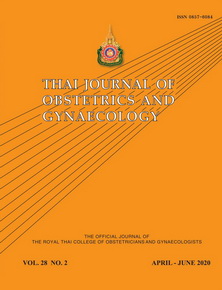Potential Factors Associated with Pelvic Lymph Node Metastasis in Endometrioid Endometrial Carcinoma
Main Article Content
Abstract
Objectives: To explore factors that associated with pelvic lymph node metastasis in endometrioid endometrial carcinoma
Materials and Methods: Two hundred and ninety-three patients with endometrioid endometrial carcinoma, who received surgical staging in Siriraj Hospital during 2008-2016, were studied. The relationship between pelvic lymph node metastasis and these data: demographic factors, biochemical markers, preoperative and intraoperative tumor characteristics were analysed by using a logistic regression model.
Results: From multivariate analysis, associated factors were grade of tumor, platelet count, deep myometrial invasion (deep MI: more than half of myometrial invasion) and size of tumor. Platelet count and size of tumor were re-calculated. Thrombocytosis (platelet count more than or equal to 380,000/mm3) and large tumor (tumor size more than or equal to 6 centimeters) were statistically significant for cut-off point.
Conclusion: Grade of tumor, platelet count, more than half of depth of myometrial invasion and size of tumor, were associated with pelvic lymph node metastasis in endometrioid endometrial carcinoma.
Article Details
References
2. Dowdy SC, Mariani A, Lurain JR. Uterine cancer. In: Berek JS, ed. Berek & Novak's Gynecology. 15th ed. Philadelphia: Wolters Kluwer Health/Lippincott Williams & Wilkins, 2012:1250-303.
3. McMeekin DS, Yashar C, Campos S, Ziano RJ. Corpus: epithelial tumors. In: Barakat RR, Berchuck A, Markman M, Randall ME, eds. Principles and practice of gynecologic oncology 6th ed. Philadelphia: Wolters Kluwer Health/Lippincott Williams & Wilkins, 2013:661-714.
4. Benedetti Panici P, Basile S, Maneschi F, Alberto Lissoni A, Signorelli M, Scambia G, et al. Systematic pelvic lymphadenectomy vs. no lymphadenectomy in early-stage endometrial carcinoma: randomized clinical trial. Journal of the National Cancer Institute 2008;100:1707-16.
5. Kitchener H, Swart AM, Qian Q, Amos C, Parmar MK. Efficacy of systematic pelvic lymphadenectomy in endometrial cancer (MRC ASTEC trial): a randomised study. Lancet 2009;373:125-36.
6. Todo Y, Kato H, Kaneuchi M, Watari H, Takeda M, Sakuragi N. Survival effect of para-aortic lymphadenectomy in endometrial cancer (SEPAL study): a retrospective cohort analysis. Lancet 2010;375:1165-72.
7. Colombo N, Creutzberg C, Amant F, Bosse T, González-Martín A, Ledermann J, et al. ESMO-ESGO-ESTRO Consensus Conference on Endometrial Cancer: diagnosis, treatment and follow-up. Ann Oncol 2016;27:16-41.
8. Koh WJ, Abu-Rustum NR, Bean S, Bradley K, Campos SM, Cho KR, et al. Uterine Neoplasms, Version 1.2018, NCCN Clinical Practice Guidelines in Oncology. J Natl Compr Canc Netw 2018;16:170-99.
9. Aleediman R, Tientong K. Association between preoperative serum biomarkers and lymph node metastasis in endometrioid adenocarcinoma of endometrium. Thai J Obstet Gynaecol 2018;26:59-67.
10. Therasakvichya S, Kuljarusnon S, Petsuksiri J, Chaopotong P, Achariyapota V, Srichaikul P, et al., Clinical outcomes of stage I endometrial carcinoma patients treated with surgery alone: Siriraj Hospital experiences. J Gynecol Oncol 2016;27:e48.
11. Mariani A, Webb MJ, Keeney GL, Haddock MG, Calori G, Podratz KC. Low-risk corpus cancer: is lymphadenectomy or radiotherapy necessary? Am J Obstet Gynecol. 2000;182:1506-19.
12. Schink JC, Rademaker AW, Miller DS, Larain JR. Tumor size in endometrial cancer. Cancer 1991;67:2791-4.
13. Shah C, Johnson EB, Everett E, Tamimi H, Greer B, Swisher E, et al. Does size matter? Tumor size and morphology as predictors of nodal status and recurrence in endometrial cancer. Gynecol Oncol 2005;99:564-70.
14. Boruta DM 2nd, Gehrig PA, Fader AN, Olawaiye AB. Management of women with uterine papillary serous cancer: a Society of Gynecologic Oncology (SGO) review. Gynecol Oncol 2009;115:142-53.
15. Teixeira AMS, Ribeiro R, Schmeler KM, Herzog TJ, Nicolau SM, Marques RM. A preoperative and intraoperative scoring system to predict nodal metastasis in endometrial cancer. Int J Gynaecol Obstet 2017;137:78-85.
16. Zhang C, Wang C, Feng W. Clinicopathological risk factors for pelvic lymph node metastasis in clinical early-stage endometrioid endometrial adenocarcinoma. Int J Gynecol Cancer 2012;22:1373-7.
17. Luomaranta A, Leminen A, Loukovaara M. Prediction of lymph node and distant metastasis in patients with endometrial carcinoma: A new model based on demographics, biochemical factors, and tumor histology. Gynecol Oncol 2013;129:28-32.


